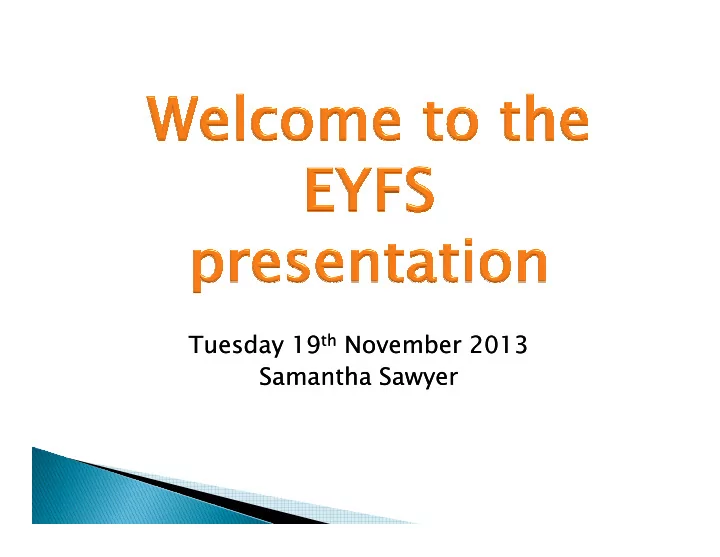

th November 2013 Tuesday 19 Tuesday 19 th November 2013 Samantha Sawyer Samantha Sawyer
What is the Early Years Foundation Stage? • The Early Years Foundation Stage (E.Y.F.S.) is the stage of education for children from birth to the end of the Reception year. • It is based on the recognition that children learn best • It is based on the recognition that children learn best through play and active learning. This is a very important stage as it helps your child get ready for school as well as preparing them for their future learning and successes. From when your child is born up until the age of 5, their early years experience should be happy, active, exciting, fun and secure; and support their development, care and learning needs.
� The EYFS Framework and combine topics from the IPC � AUTUMN Term - Family & Friends and Animals � SPRING Term- Pattern and Changes SPRING Term- Pattern and Changes � SUMMER Term- Up and Away and Treasure
The E.Y.F.S. has 4 themes. These are: 1 A Unique Child 2 2 Positive Relationships Positive Relationships 3 Enabling Environments 4 Learning and Development
Every child is a competent learner from birth who can be resilient, capable, birth who can be resilient, capable, confident and self assured
Children learn to be strong and independent from a base of loving and secure relationships with parents and or a key person a key person
The environment plays a key role in supporting and extending children’s supporting and extending children’s development and learning.
Children develop and learn in different ways and at different rates and all areas of Learning and Development are equally important and inter-connected. important and inter-connected.
Your child will be learning skills, acquiring new knowledge and demonstrating their understanding through 7 areas of learning and development. Children should mostly develop the 3 prime areas first. These are: areas first. These are: 1. Communication and language 2. Physical development 3. Personal, social and emotional development.
The children will be learning to: � talk confidently and clearly; � show awareness of listener � show awareness of listener � enjoy listening to stories, songs and poems, showing good attention; � follow instructions; � answer questions about stories
The children will be learning to: � move confidently; � control their body; � handle equipment. � handle equipment. � manage their own basic hygiene and personal needs including dressing and undressing independently
The children will be learning to: � become self-confident; � have awareness of their own feelings and � have awareness of their own feelings and feelings of others; feelings of others; � take an interest in things; � become independent; � tell the difference between right and wrong.
As children grow, the prime areas will help them to develop skills in 4 specific areas . These are: 1. Literacy; 2. Mathematics; 2. Mathematics; 3. Understanding the world; and 4. Expressive arts and design.
hear and say sounds, and link them to the alphabet; read and write familiar words and sentences; learn to use a pencil effectively.
The children will be learning to: � develop an understanding of maths through stories, songs, games and imaginative play; � become comfortable with numbers and with ideas such as 'heavier than' or 'bigger’; � be aware of shapes and space.
The children will: � explore and find out about the world around them, asking questions about it; � � build with different materials, know about everyday technology and learn what it is used for; � find out about past events in their lives and their families' lives; � find out about different cultures and beliefs.
The children will explore: � colours and shapes; � colours and shapes; � making things; � role play; � making music and singing songs
The Learning Environment Why play out? Outdoor provision is vital for and young children. A rich outdoor play space will offer your child: Space to be noisy, active and boisterous Fresh air – allows more oxygen to the brain Fresh air – allows more oxygen to the brain Experience of different weathers and seasons Direct contact with the natural world Freedom; do things not possible indoors - MESS! Multi-sensory experiences Emotional and physical well being Real experiences – growing, digging, sweeping Challenge and awareness of safety Natural light - essential for learning
Each of the 7 areas of learning has its own set of Early Learning Goals which determine what most children are expected to achieve by the end of Reception Class. During Nursery and at Reception class level children are assessed against expectations called development matters These statements will be updated regularly throughout the year to show your child’s development and areas where they need further support.
How you can find out how your child is getting on?
� Please ensure that your child’s name is in all items of clothing, including shoes! � P.E kit must be kept in school, it can be taken home half termly to be washed. � Your child will be taking part in lots of interesting and sometimes messy experiences, interesting and sometimes messy experiences, so may come home dirty! It is all part of the fun! � Appropriate clothing for all weather conditions.
Please remember…. If you have any concerns or questions, we will be happy to help you. Date for your diary Parental workshop Parental workshop Shonette Bason 28 th January 2014 4pm-5pm
“Play is the highest form of research.” Albert Einstein Albert Einstein
Recommend
More recommend